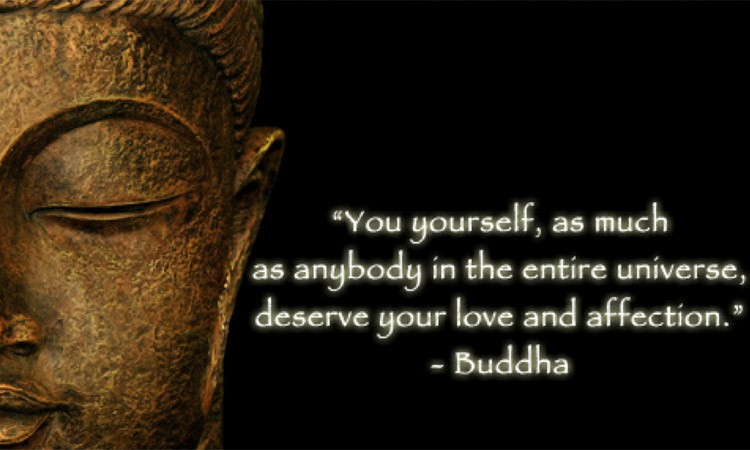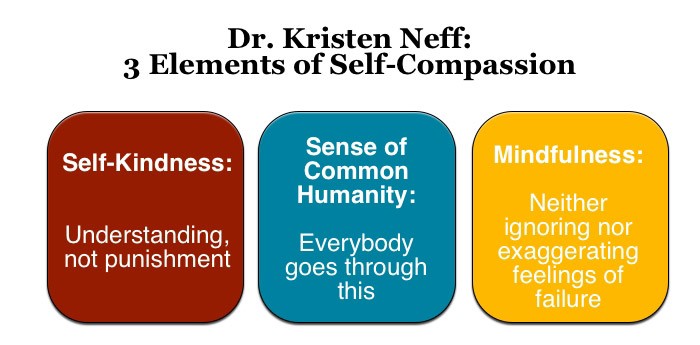As kids we’re often taught to treat others as well as we would want to be treated. This is a very wise lesson, yet we often neglect to offer kindness to the most important person in our lives: ourselves! When we are hard on ourselves during difficult moments, this only serves to worsen our predicament and suffering. More specifically those who are consistently self-critical experience greater feelings of anxiety and depression, increased levels of procrastination, and decreased goal completion.
Conversely, research suggests, a consistent practice of that self compassion actually paves the path towards happiness, optimism, and personal well-being. It can also serve as a protective factor against anxiety and lead to increased resilience in difficult situations. Self-compassion can help people recover from a loss like a breakup or divorce more quickly and with greater ease. And, when it comes to motivation and goal completion, it turns out that people who are compassionate towards themselves after making a mistake or identifying a personal weakness have increased motivation with regards to self-improvement.
Given the significant benefits of self-compassion let’s get a better sense of what it is and how you can increase its presence in your life.
What is self-compassion?
Self-compassion is about responding to your own suffering with kindness and understanding rather than judgement or criticism. It is the act of relating to your own struggles with the same warmth and openness that you would offer to another who was in pain. Simply put, it is about being nice to yourself. This requires kicking the self-critical thoughts like “I’m an idiot” or “I look horrible” or “I’m never going to be good enough” to the curb. It means that when you mess up at work or eat that extra piece of chocolate cake you give yourself the emotional equivalent of a hug rather than a whipping. You acknowledge your own suffering and the fact that you are an imperfect human who deserves kindness even in the face of failure.
3 Components of Self Compassion
Leading self-compassion researcher, Kristen Neff, has identified 3 core components to Self-Compassion: mindfulness, common humanity, and kindness.
Mindfulness, as defined by Jon Kabat Zinn, is about paying attention, on purpose and without judgement to your experience in the moment.” In order to be compassionate towards yourself, you first have to notice your own suffering. Rather than pushing away uncomfortable feelings, observing them without judgement allows us to remain present with whatever is arising.
When we are in pain we often feel very alone. Common humanity, refers to the fact that suffering is something all humans experience. When we acknowledge that feeling of disappointment, inadequacy, or sadness we feel less alone and are able to be more compassionate to ourselves.
Once you’ve noticed your own suffering and accepted that you are not alone you must commit to relating to yourself with kindness. This means offering yourself empathy, understanding, and warmth in difficult moments. Instead of saying “what’s wrong with you, you stupid loser” you are able to say “I am so sorry that you are having a difficult time right now.”
Strategies for Increasing Self-Compassion
Here are three ways that you can kick the habit of being hard on yourself and exercise your self-compassion muscle instead.
Channel The Words You Would Say To A Friend
When you are having a hard time close your eyes and imagine that someone you care for deeply is experiencing the same pain. Think about what you would say to this friend. What kind words would you offer? How would you provide empathy, encouragement, and a sense of hope? Once you’ve clearly identified what you would say to your friend, pause and say those exact words to yourself. If you feel funny saying these things out loud (or even in your own mind) write yourself a letter with these statements.
Develop A Self-Compassion Mantra
Kristen Neff, suggests that you develop a personal self-compassion mantra that you can lean on when you find yourself buried in self-criticism or flooded with painful emotions. In her book Self-Compassion, she suggests constructing a mantra based on these three components discussed above: 1) acknowledging your pain, 2) recognizing that suffering is a part of the human experience and 3) commit to being kind to yourself. An example might be “This is really painful, but I realize that I am not alone in my suffering. May I be loving towards myself and accept myself just the way I am.” Be sure to make it something that is easily memorized so you can call it up in even the most difficult of moments.
Stimulate Oxytocin With Touch
Physical touch is a wonderful gesture of self-compassion. It’s a way of communicating to the body that “I’m here for you, everything is going to be okay.” Additionally, touch releases oxytocin, a chemical associated with decreasing cortisol levels (the stress hormone). So even though we usually lean on others to provide that hug or rub our backs when we’re feeling down, providing yourself with some compassionate gestures of touch can have the same chemical benefit. During a stressful moment try placing a hand on your heart, rubbing your own arms, or massaging your head.
Next time you catch yourself in an act of self-flagellation, take a moment to notice your suffering, recognize you are not alone, and commit to being kind to yourself. Remember that it may feel challenging at first to act with self compassion, but the benefits are worth it and more importantly, you are worth it!
[sdonations]2[/sdonations]



